Swinburne University LAW10004: Freedom of Courts and Precedent
VerifiedAdded on 2022/09/09
|6
|1286
|13
Essay
AI Summary
This essay, prepared for Swinburne University's LAW10004 course, critically examines the extent to which the doctrine of precedent restricts the freedom of courts and judges to create laws. The essay begins by introducing the traditional 'declaratory' function of courts and contrasts it with the contemporary acknowledgment of courts' lawmaking roles. It delves into the historical context, discussing the doctrine's origins and its reception by prominent English judges. The essay then analyzes key cases such as Shaw v DPP, Hedley Byrne & Co Ltd v Heller & Partners Ltd, and Rookes v Barnard, illustrating how courts have shaped law through their decisions. It also addresses the challenges courts face when deciding whether to reform legal principles, particularly in the context of legislative inaction. The essay concludes by arguing that while precedent is a significant source of law, it does not ultimately restrict the courts' ability to establish laws. This assignment provides a comprehensive overview of the topic, supported by relevant case law and legal arguments.
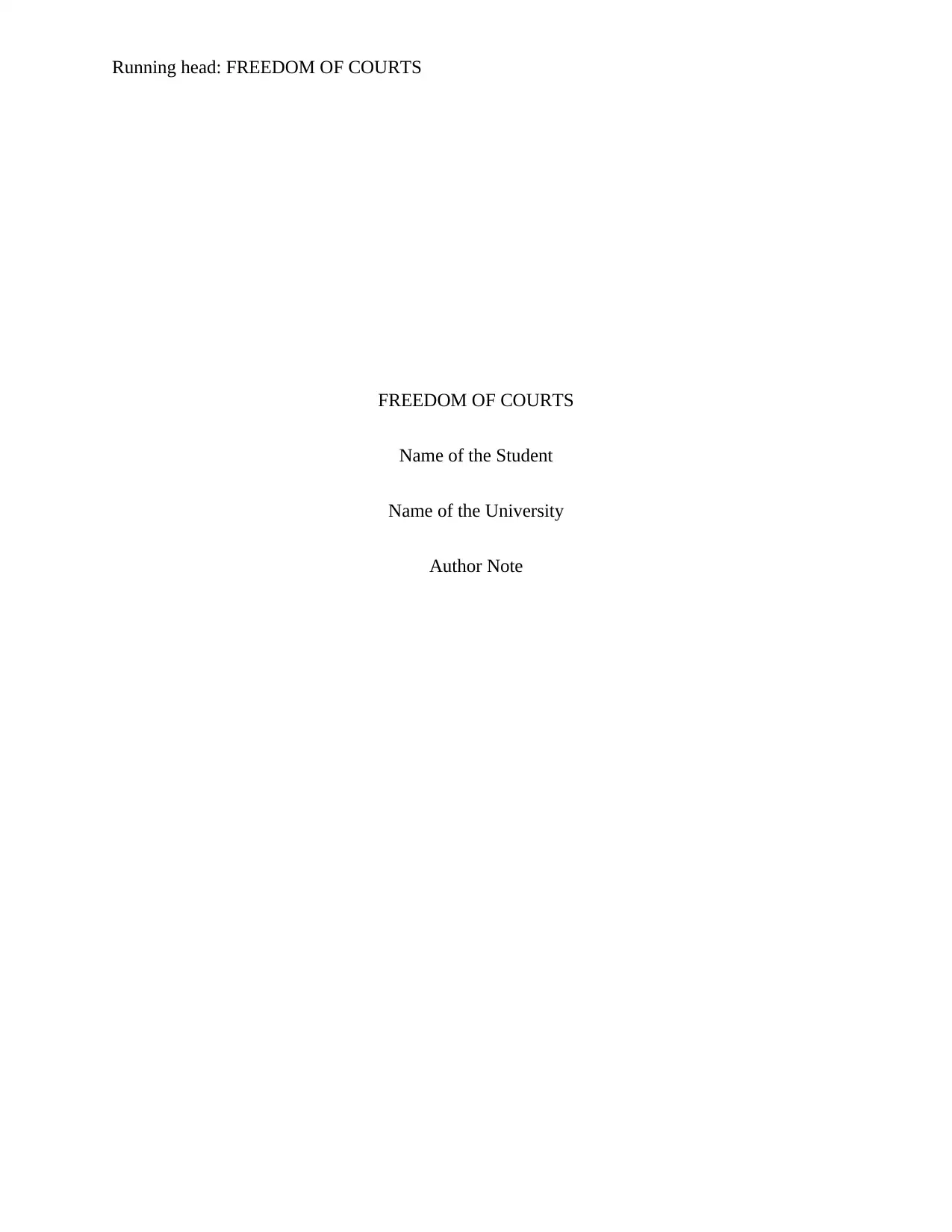
Running head: FREEDOM OF COURTS
FREEDOM OF COURTS
Name of the Student
Name of the University
Author Note
FREEDOM OF COURTS
Name of the Student
Name of the University
Author Note
Paraphrase This Document
Need a fresh take? Get an instant paraphrase of this document with our AI Paraphraser
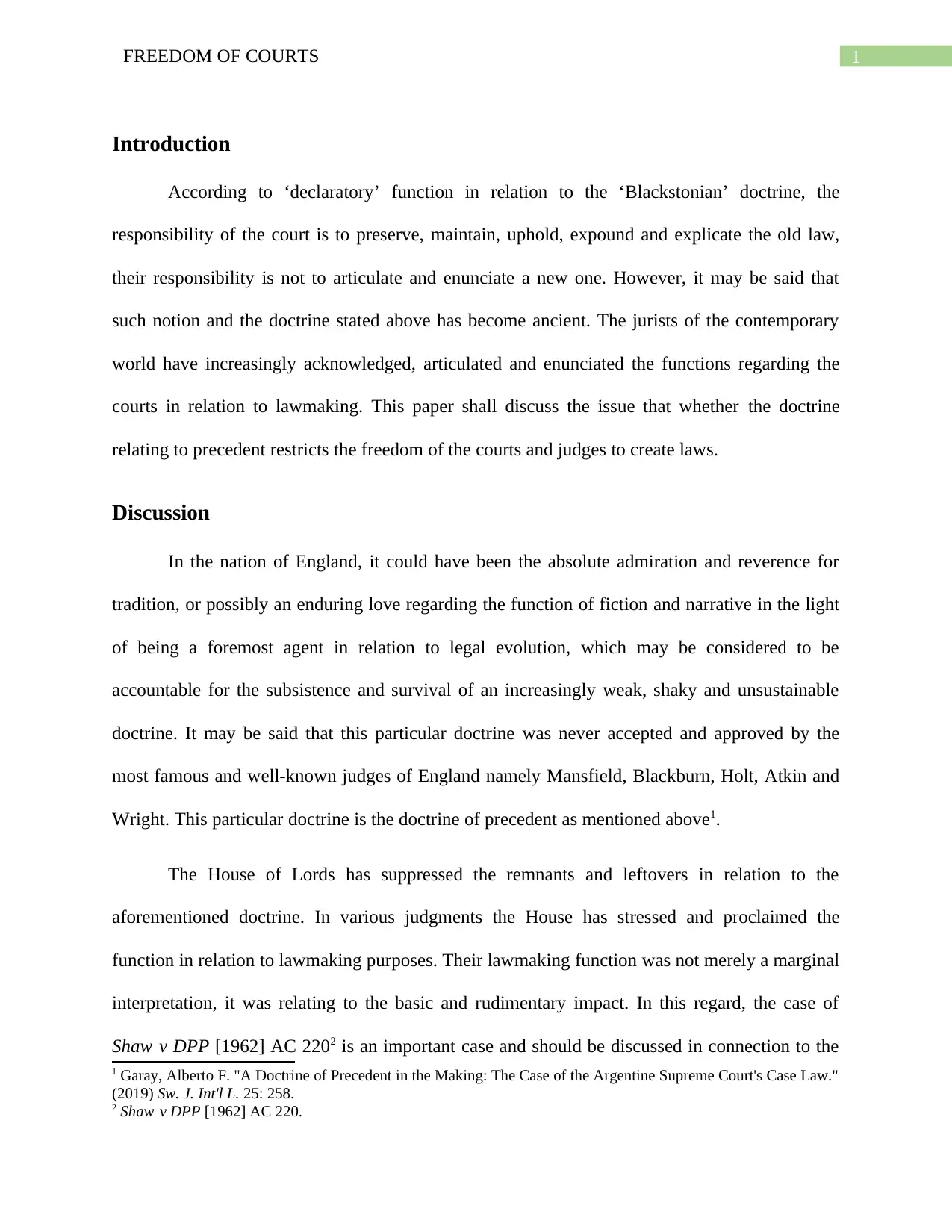
1FREEDOM OF COURTS
Introduction
According to ‘declaratory’ function in relation to the ‘Blackstonian’ doctrine, the
responsibility of the court is to preserve, maintain, uphold, expound and explicate the old law,
their responsibility is not to articulate and enunciate a new one. However, it may be said that
such notion and the doctrine stated above has become ancient. The jurists of the contemporary
world have increasingly acknowledged, articulated and enunciated the functions regarding the
courts in relation to lawmaking. This paper shall discuss the issue that whether the doctrine
relating to precedent restricts the freedom of the courts and judges to create laws.
Discussion
In the nation of England, it could have been the absolute admiration and reverence for
tradition, or possibly an enduring love regarding the function of fiction and narrative in the light
of being a foremost agent in relation to legal evolution, which may be considered to be
accountable for the subsistence and survival of an increasingly weak, shaky and unsustainable
doctrine. It may be said that this particular doctrine was never accepted and approved by the
most famous and well-known judges of England namely Mansfield, Blackburn, Holt, Atkin and
Wright. This particular doctrine is the doctrine of precedent as mentioned above1.
The House of Lords has suppressed the remnants and leftovers in relation to the
aforementioned doctrine. In various judgments the House has stressed and proclaimed the
function in relation to lawmaking purposes. Their lawmaking function was not merely a marginal
interpretation, it was relating to the basic and rudimentary impact. In this regard, the case of
Shaw v DPP [1962] AC 2202 is an important case and should be discussed in connection to the
1 Garay, Alberto F. "A Doctrine of Precedent in the Making: The Case of the Argentine Supreme Court's Case Law."
(2019) Sw. J. Int'l L. 25: 258.
2 Shaw v DPP [1962] AC 220.
Introduction
According to ‘declaratory’ function in relation to the ‘Blackstonian’ doctrine, the
responsibility of the court is to preserve, maintain, uphold, expound and explicate the old law,
their responsibility is not to articulate and enunciate a new one. However, it may be said that
such notion and the doctrine stated above has become ancient. The jurists of the contemporary
world have increasingly acknowledged, articulated and enunciated the functions regarding the
courts in relation to lawmaking. This paper shall discuss the issue that whether the doctrine
relating to precedent restricts the freedom of the courts and judges to create laws.
Discussion
In the nation of England, it could have been the absolute admiration and reverence for
tradition, or possibly an enduring love regarding the function of fiction and narrative in the light
of being a foremost agent in relation to legal evolution, which may be considered to be
accountable for the subsistence and survival of an increasingly weak, shaky and unsustainable
doctrine. It may be said that this particular doctrine was never accepted and approved by the
most famous and well-known judges of England namely Mansfield, Blackburn, Holt, Atkin and
Wright. This particular doctrine is the doctrine of precedent as mentioned above1.
The House of Lords has suppressed the remnants and leftovers in relation to the
aforementioned doctrine. In various judgments the House has stressed and proclaimed the
function in relation to lawmaking purposes. Their lawmaking function was not merely a marginal
interpretation, it was relating to the basic and rudimentary impact. In this regard, the case of
Shaw v DPP [1962] AC 2202 is an important case and should be discussed in connection to the
1 Garay, Alberto F. "A Doctrine of Precedent in the Making: The Case of the Argentine Supreme Court's Case Law."
(2019) Sw. J. Int'l L. 25: 258.
2 Shaw v DPP [1962] AC 220.
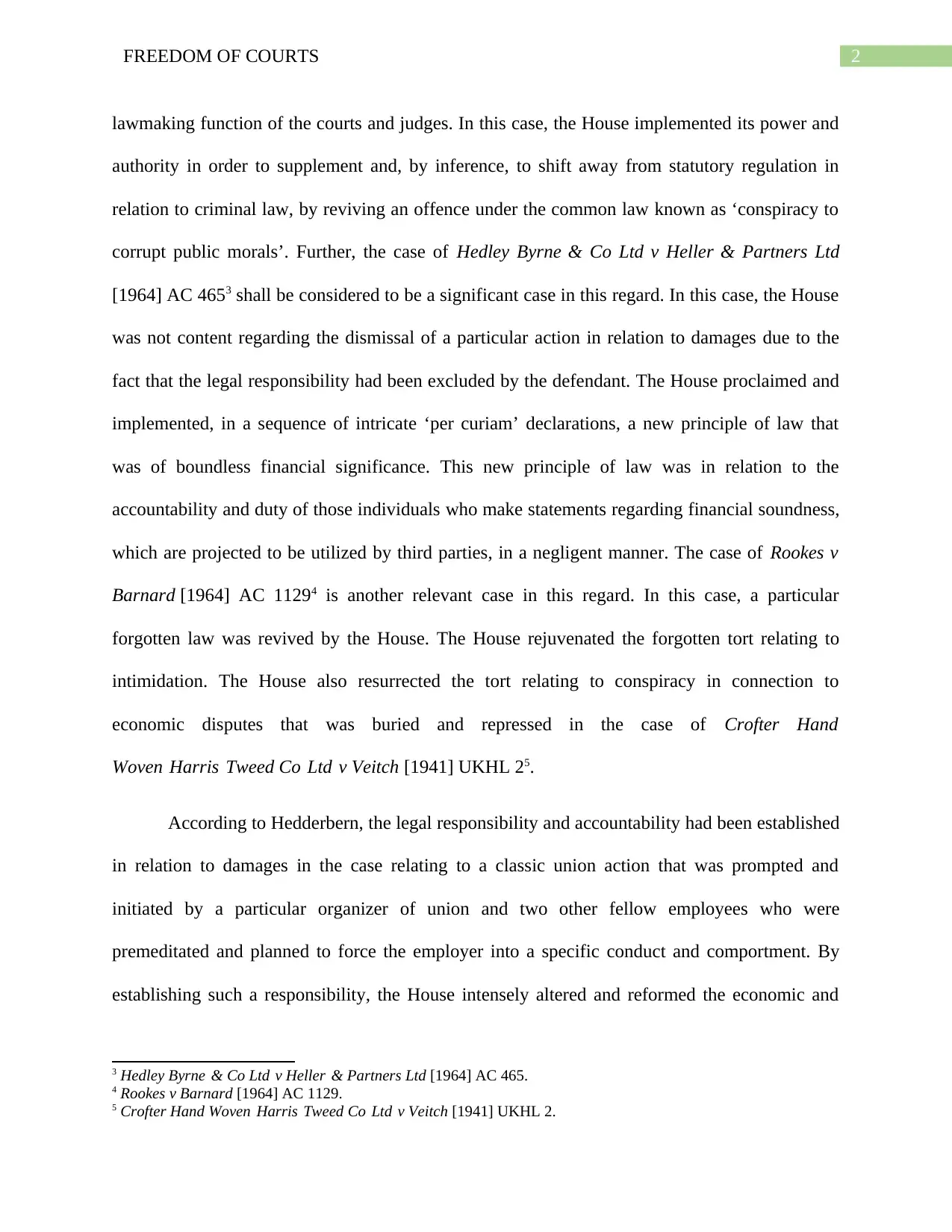
2FREEDOM OF COURTS
lawmaking function of the courts and judges. In this case, the House implemented its power and
authority in order to supplement and, by inference, to shift away from statutory regulation in
relation to criminal law, by reviving an offence under the common law known as ‘conspiracy to
corrupt public morals’. Further, the case of Hedley Byrne & Co Ltd v Heller & Partners Ltd
[1964] AC 4653 shall be considered to be a significant case in this regard. In this case, the House
was not content regarding the dismissal of a particular action in relation to damages due to the
fact that the legal responsibility had been excluded by the defendant. The House proclaimed and
implemented, in a sequence of intricate ‘per curiam’ declarations, a new principle of law that
was of boundless financial significance. This new principle of law was in relation to the
accountability and duty of those individuals who make statements regarding financial soundness,
which are projected to be utilized by third parties, in a negligent manner. The case of Rookes v
Barnard [1964] AC 11294 is another relevant case in this regard. In this case, a particular
forgotten law was revived by the House. The House rejuvenated the forgotten tort relating to
intimidation. The House also resurrected the tort relating to conspiracy in connection to
economic disputes that was buried and repressed in the case of Crofter Hand
Woven Harris Tweed Co Ltd v Veitch [1941] UKHL 25.
According to Hedderbern, the legal responsibility and accountability had been established
in relation to damages in the case relating to a classic union action that was prompted and
initiated by a particular organizer of union and two other fellow employees who were
premeditated and planned to force the employer into a specific conduct and comportment. By
establishing such a responsibility, the House intensely altered and reformed the economic and
3 Hedley Byrne & Co Ltd v Heller & Partners Ltd [1964] AC 465.
4 Rookes v Barnard [1964] AC 1129.
5 Crofter Hand Woven Harris Tweed Co Ltd v Veitch [1941] UKHL 2.
lawmaking function of the courts and judges. In this case, the House implemented its power and
authority in order to supplement and, by inference, to shift away from statutory regulation in
relation to criminal law, by reviving an offence under the common law known as ‘conspiracy to
corrupt public morals’. Further, the case of Hedley Byrne & Co Ltd v Heller & Partners Ltd
[1964] AC 4653 shall be considered to be a significant case in this regard. In this case, the House
was not content regarding the dismissal of a particular action in relation to damages due to the
fact that the legal responsibility had been excluded by the defendant. The House proclaimed and
implemented, in a sequence of intricate ‘per curiam’ declarations, a new principle of law that
was of boundless financial significance. This new principle of law was in relation to the
accountability and duty of those individuals who make statements regarding financial soundness,
which are projected to be utilized by third parties, in a negligent manner. The case of Rookes v
Barnard [1964] AC 11294 is another relevant case in this regard. In this case, a particular
forgotten law was revived by the House. The House rejuvenated the forgotten tort relating to
intimidation. The House also resurrected the tort relating to conspiracy in connection to
economic disputes that was buried and repressed in the case of Crofter Hand
Woven Harris Tweed Co Ltd v Veitch [1941] UKHL 25.
According to Hedderbern, the legal responsibility and accountability had been established
in relation to damages in the case relating to a classic union action that was prompted and
initiated by a particular organizer of union and two other fellow employees who were
premeditated and planned to force the employer into a specific conduct and comportment. By
establishing such a responsibility, the House intensely altered and reformed the economic and
3 Hedley Byrne & Co Ltd v Heller & Partners Ltd [1964] AC 465.
4 Rookes v Barnard [1964] AC 1129.
5 Crofter Hand Woven Harris Tweed Co Ltd v Veitch [1941] UKHL 2.
⊘ This is a preview!⊘
Do you want full access?
Subscribe today to unlock all pages.

Trusted by 1+ million students worldwide
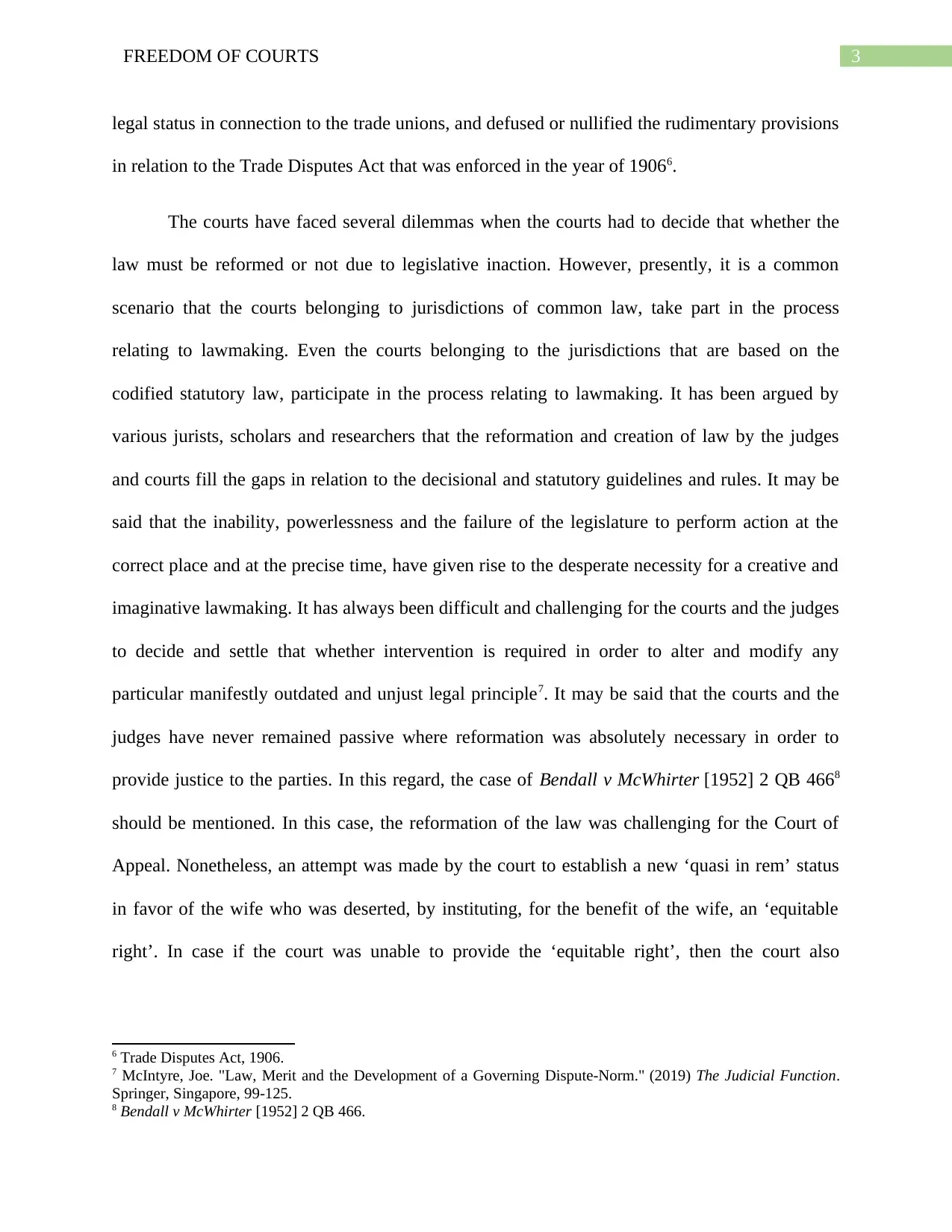
3FREEDOM OF COURTS
legal status in connection to the trade unions, and defused or nullified the rudimentary provisions
in relation to the Trade Disputes Act that was enforced in the year of 19066.
The courts have faced several dilemmas when the courts had to decide that whether the
law must be reformed or not due to legislative inaction. However, presently, it is a common
scenario that the courts belonging to jurisdictions of common law, take part in the process
relating to lawmaking. Even the courts belonging to the jurisdictions that are based on the
codified statutory law, participate in the process relating to lawmaking. It has been argued by
various jurists, scholars and researchers that the reformation and creation of law by the judges
and courts fill the gaps in relation to the decisional and statutory guidelines and rules. It may be
said that the inability, powerlessness and the failure of the legislature to perform action at the
correct place and at the precise time, have given rise to the desperate necessity for a creative and
imaginative lawmaking. It has always been difficult and challenging for the courts and the judges
to decide and settle that whether intervention is required in order to alter and modify any
particular manifestly outdated and unjust legal principle7. It may be said that the courts and the
judges have never remained passive where reformation was absolutely necessary in order to
provide justice to the parties. In this regard, the case of Bendall v McWhirter [1952] 2 QB 4668
should be mentioned. In this case, the reformation of the law was challenging for the Court of
Appeal. Nonetheless, an attempt was made by the court to establish a new ‘quasi in rem’ status
in favor of the wife who was deserted, by instituting, for the benefit of the wife, an ‘equitable
right’. In case if the court was unable to provide the ‘equitable right’, then the court also
6 Trade Disputes Act, 1906.
7 McIntyre, Joe. "Law, Merit and the Development of a Governing Dispute-Norm." (2019) The Judicial Function.
Springer, Singapore, 99-125.
8 Bendall v McWhirter [1952] 2 QB 466.
legal status in connection to the trade unions, and defused or nullified the rudimentary provisions
in relation to the Trade Disputes Act that was enforced in the year of 19066.
The courts have faced several dilemmas when the courts had to decide that whether the
law must be reformed or not due to legislative inaction. However, presently, it is a common
scenario that the courts belonging to jurisdictions of common law, take part in the process
relating to lawmaking. Even the courts belonging to the jurisdictions that are based on the
codified statutory law, participate in the process relating to lawmaking. It has been argued by
various jurists, scholars and researchers that the reformation and creation of law by the judges
and courts fill the gaps in relation to the decisional and statutory guidelines and rules. It may be
said that the inability, powerlessness and the failure of the legislature to perform action at the
correct place and at the precise time, have given rise to the desperate necessity for a creative and
imaginative lawmaking. It has always been difficult and challenging for the courts and the judges
to decide and settle that whether intervention is required in order to alter and modify any
particular manifestly outdated and unjust legal principle7. It may be said that the courts and the
judges have never remained passive where reformation was absolutely necessary in order to
provide justice to the parties. In this regard, the case of Bendall v McWhirter [1952] 2 QB 4668
should be mentioned. In this case, the reformation of the law was challenging for the Court of
Appeal. Nonetheless, an attempt was made by the court to establish a new ‘quasi in rem’ status
in favor of the wife who was deserted, by instituting, for the benefit of the wife, an ‘equitable
right’. In case if the court was unable to provide the ‘equitable right’, then the court also
6 Trade Disputes Act, 1906.
7 McIntyre, Joe. "Law, Merit and the Development of a Governing Dispute-Norm." (2019) The Judicial Function.
Springer, Singapore, 99-125.
8 Bendall v McWhirter [1952] 2 QB 466.
Paraphrase This Document
Need a fresh take? Get an instant paraphrase of this document with our AI Paraphraser
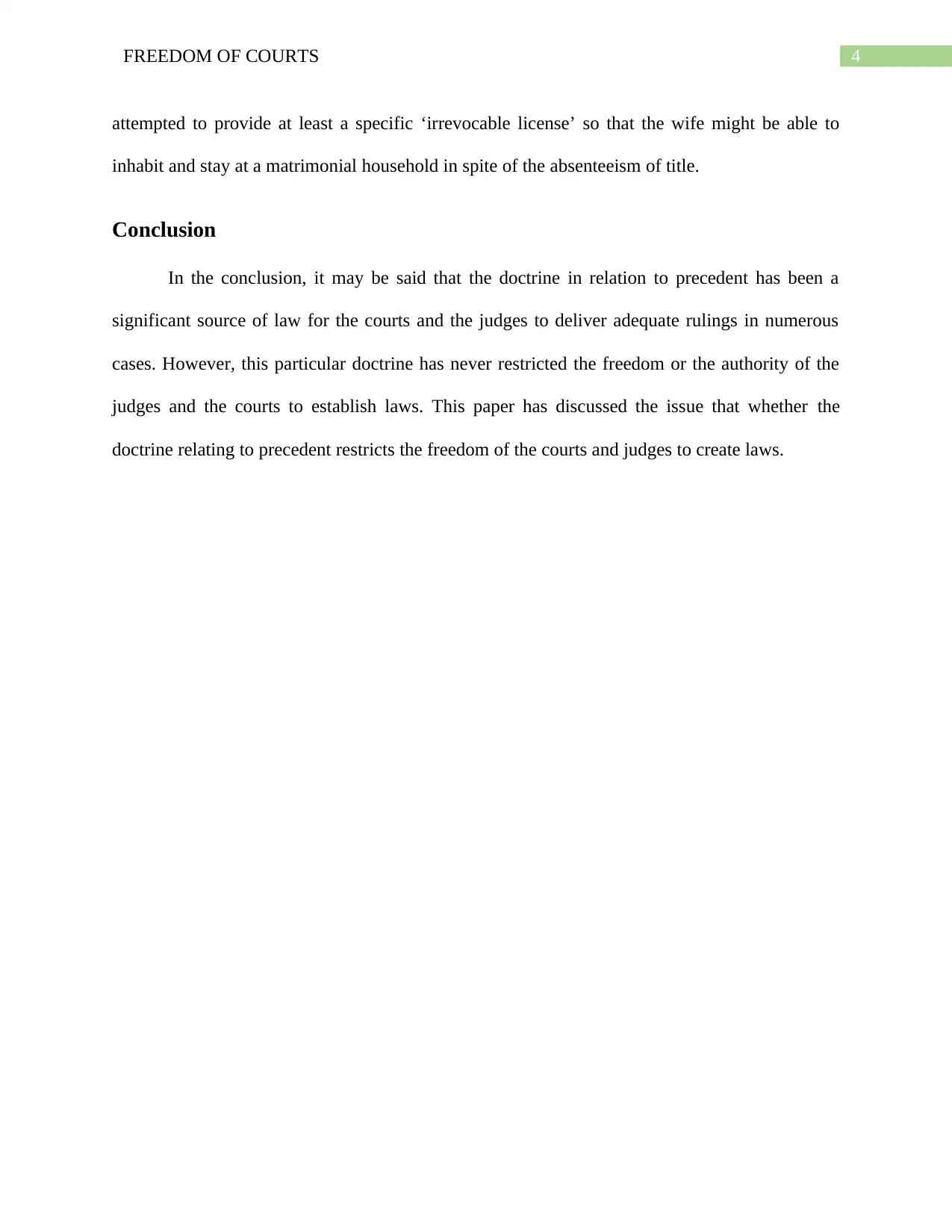
4FREEDOM OF COURTS
attempted to provide at least a specific ‘irrevocable license’ so that the wife might be able to
inhabit and stay at a matrimonial household in spite of the absenteeism of title.
Conclusion
In the conclusion, it may be said that the doctrine in relation to precedent has been a
significant source of law for the courts and the judges to deliver adequate rulings in numerous
cases. However, this particular doctrine has never restricted the freedom or the authority of the
judges and the courts to establish laws. This paper has discussed the issue that whether the
doctrine relating to precedent restricts the freedom of the courts and judges to create laws.
attempted to provide at least a specific ‘irrevocable license’ so that the wife might be able to
inhabit and stay at a matrimonial household in spite of the absenteeism of title.
Conclusion
In the conclusion, it may be said that the doctrine in relation to precedent has been a
significant source of law for the courts and the judges to deliver adequate rulings in numerous
cases. However, this particular doctrine has never restricted the freedom or the authority of the
judges and the courts to establish laws. This paper has discussed the issue that whether the
doctrine relating to precedent restricts the freedom of the courts and judges to create laws.
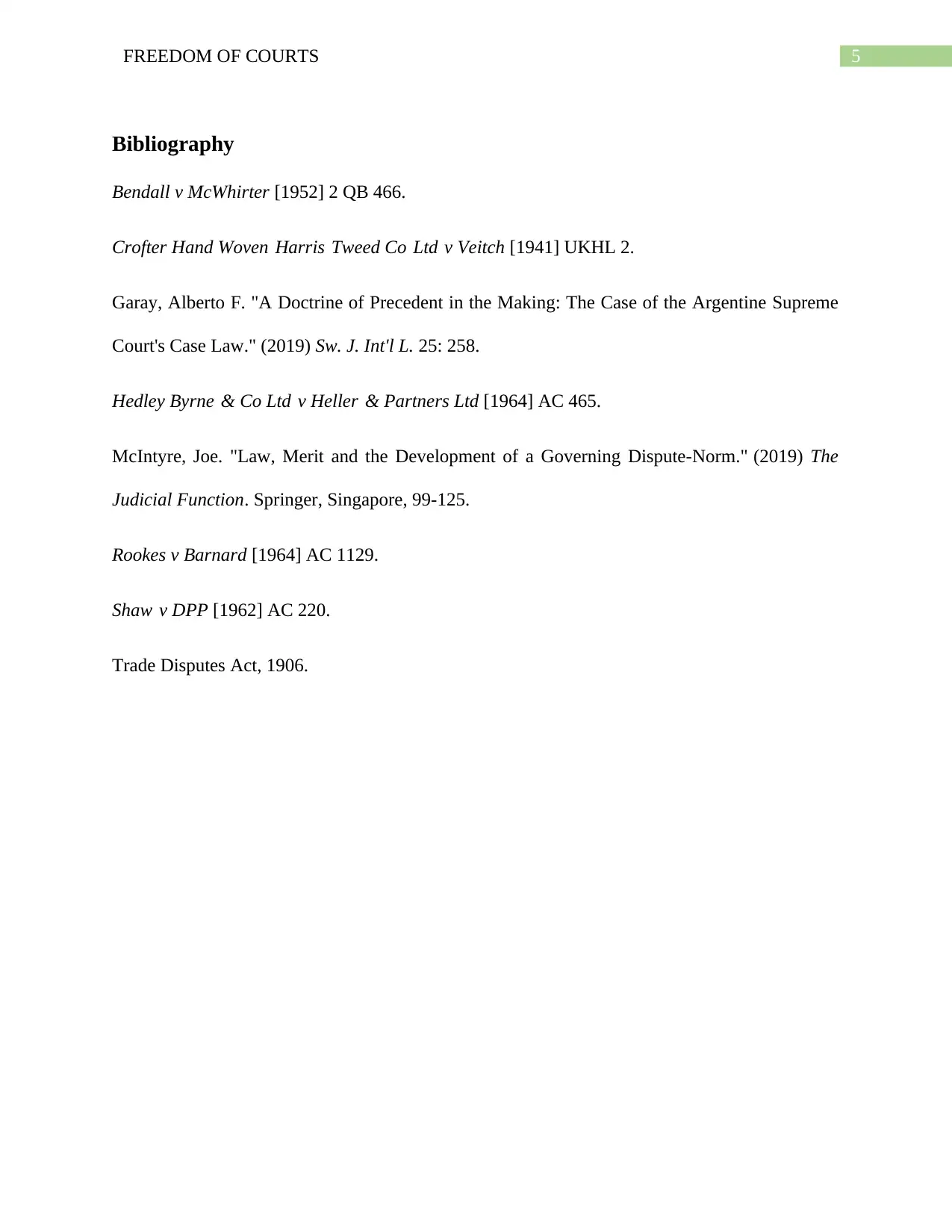
5FREEDOM OF COURTS
Bibliography
Bendall v McWhirter [1952] 2 QB 466.
Crofter Hand Woven Harris Tweed Co Ltd v Veitch [1941] UKHL 2.
Garay, Alberto F. "A Doctrine of Precedent in the Making: The Case of the Argentine Supreme
Court's Case Law." (2019) Sw. J. Int'l L. 25: 258.
Hedley Byrne & Co Ltd v Heller & Partners Ltd [1964] AC 465.
McIntyre, Joe. "Law, Merit and the Development of a Governing Dispute-Norm." (2019) The
Judicial Function. Springer, Singapore, 99-125.
Rookes v Barnard [1964] AC 1129.
Shaw v DPP [1962] AC 220.
Trade Disputes Act, 1906.
Bibliography
Bendall v McWhirter [1952] 2 QB 466.
Crofter Hand Woven Harris Tweed Co Ltd v Veitch [1941] UKHL 2.
Garay, Alberto F. "A Doctrine of Precedent in the Making: The Case of the Argentine Supreme
Court's Case Law." (2019) Sw. J. Int'l L. 25: 258.
Hedley Byrne & Co Ltd v Heller & Partners Ltd [1964] AC 465.
McIntyre, Joe. "Law, Merit and the Development of a Governing Dispute-Norm." (2019) The
Judicial Function. Springer, Singapore, 99-125.
Rookes v Barnard [1964] AC 1129.
Shaw v DPP [1962] AC 220.
Trade Disputes Act, 1906.
⊘ This is a preview!⊘
Do you want full access?
Subscribe today to unlock all pages.

Trusted by 1+ million students worldwide
1 out of 6
Your All-in-One AI-Powered Toolkit for Academic Success.
+13062052269
info@desklib.com
Available 24*7 on WhatsApp / Email
![[object Object]](/_next/static/media/star-bottom.7253800d.svg)
Unlock your academic potential
Copyright © 2020–2025 A2Z Services. All Rights Reserved. Developed and managed by ZUCOL.

